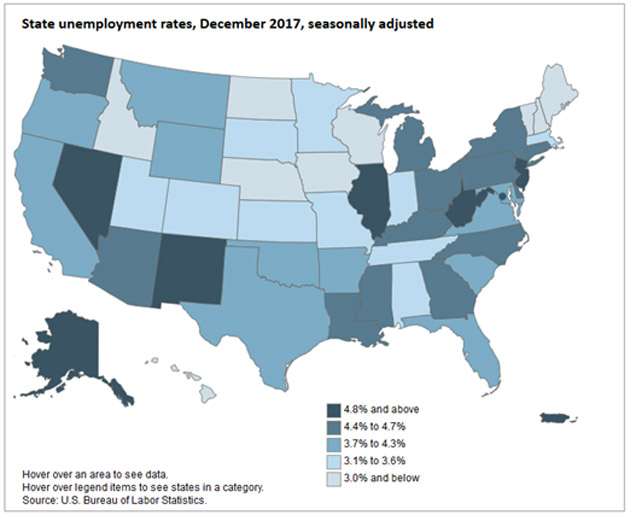| -- | March 6, 2018 The Full Employment Mirage By Patrick Watson Judging by the official 4.1% unemployment rate, US workers appear to be doing pretty well. Unlike a few years ago, almost everyone who wants a job has one. That’s an improvement. Having “a job” isn’t the same as having a good job, of course, one that pays enough to cover your needs and lets you feel worthy and productive. Those are more elusive, although the situation is far better than it was during the recession. But these conclusions come from data that looks at averages, and few people are average. I thought about this because recently I’ve been helping John Mauldin write about the problems with economic data. That low unemployment rate is a key reason the Federal Reserve plans to hike interest rates three times this year (some people even think it will be four times). That could be a serious mistake because millions of people aren’t as secure and stable as the unemployment rate implies. The Fed should know this… because the Fed itself says so. 
Photo: Getty Images Not-So-Quality Jobs The Federal Reserve Board has vast resources to give it every possible bit of useful data. One such resource: The Community Advisory Council (CAC). Its role is to give the Board “diverse perspectives on the economic circumstances and financial services needs of consumers and communities, with a particular focus on the concerns of low- and moderate-income populations.” That sounds useful. If wages are the key to 2018, as I wrote recently, the Fed should hear from average wage-earners as well as bankers and politicians. This is particularly important on job and wage issues. Like inflation, the unemployment rate doesn’t reflect everyone’s situation. If people are “employed” but still in terrible conditions, the Fed may charge ahead with the wrong policies. The CAC’s input should reduce that risk—but apparently, it’s not. The Fed’s Board of Governors met with the CAC on November 3, 2017. You can read the official record here. And here’s part of the council’s jobs input. (I’ve split it into bullet points for clarity, but this is a direct quote.) - “The data indicate that despite the drop in unemployment, there has not been an increase in the number of quality jobs—those that pay enough to cover expenses and enable workers to save for the future.”
- “The 2017 Scorecard reports that one in four jobs in the U.S. is in a low-wage occupation, which means that at the median salary, these jobs pay below the poverty threshold for a family of four.”
- “The rate of low-wage jobs has remained relatively stagnant since 2012, and in six states (Alabama, Arkansas, Louisiana, Mississippi, New Mexico, and West Virginia), more than one in three jobs is in a low-wage occupation.”
So according to the Fed’s own advisory council, lower unemployment isn’t bringing “quality jobs” to everyone, or even most people. The number in that second bullet is startling: one in four US jobs doesn’t pay enough to keep a family of four above the poverty line. It’s even worse in some states… but that doesn’t necessarily show up in state-level unemployment data. 
Image: Bureau of Labor Statistics As of December 2017, two the states the CAC named (Alabama and Arkansas) had lower unemployment rates than the national average, yet one of three jobs in those states were in the “low-wage” category. But if all you saw was is the unemployment rate, you might think they were doing fine. Federal Reserve officials know this, or should know it, because their own advisors are telling them about it. Yet all indications are they will proceed with another rate hike this month, and probably two or three more this year, in part because the US is at full employment. See a problem? This “full employment” is one of those desert mirages: cool, refreshing water that isn’t really there. 
Photo: Getty Images Driving to Poverty It’s true that the economy is changing. People have new opportunities that old data methods don’t capture. However, the data we do have isn’t always encouraging. Consider the “gig economy” jobs, like driving for Uber or Lyft, which give people a way to make extra income. Maybe it helps, but not much. Drivers for the ride-sharing services have to pay their own expenses. According to an MIT study released last month, the median driver profit is $3.37 per hour before taxes. And that’s the median, so half the drivers make even less. MIT found that 74% of Uber and Lyft drivers earn less than the minimum wage in their state, and 30% actually lose money when you add in vehicle expenses. For some, the loss might have helped reduce their taxes on other income. But the higher standard deduction that takes effect this year may reduce or eliminate that benefit for many. Clearly, the gig economy isn’t as miracle-producing as some people think. 
Photo: Getty Images Incoming Data This Friday, we’ll get another round of jobs data, and it will probably look good on the surface. For some people, it probably is good—but not for everyone. Nonetheless, the Fed is plodding ahead on its balance-sheet reduction plan and raising short-term interest rates too. Listen carefully and you’ll notice a shift in language: Officials have been describing economic “tailwinds” instead of headwinds. Right or wrong, they think this economy, in which their own experts say one in four jobs pay only poverty-level wages, is growing just fine and needs no stimulus. If anything, they want to slow it down. I doubt this will end happily, but we’ll find out soon. This week, I’m in San Diego for the Strategic Investment Conference, so maybe I’ll get answers to some of those questions. I especially want to hear economists Lacy Hunt, David McWilliams, and David Rosenberg. If you aren’t attending the conference in person, you can still join the fun with our Virtual Pass. You get video and audio recordings of all the sessions (20+ hours) and access to the live stream if you want to watch as it happens. Better yet, order now, and you can save $400 off the Virtual Pass. Click here to learn more. See you at the top,  Patrick Watson P.S. If you’re reading this because someone shared it with you, click here to get your own free Connecting the Dots subscription. You can also follow me on Twitter: @PatrickW.  | Subscribe to Connecting the Dots—and Get a Glimpse of the Future
We live in an era of rapid change… and only those who see and understand the shifting market, economic, and political trends can make wise investment decisions. Macroeconomic forecaster Patrick Watson spots the trends and spells what they mean every week in the free e-letter, Connecting the Dots. Subscribe now for his seasoned insight into the surprising forces driving global markets. |
 Senior Economic Analyst Patrick Watson is a master in connecting the dots and finding out where budding trends are leading. Patrick is the editor of Mauldin Economics’ high-yield income letter, Yield Shark, and co-editor of the premium alert service, Macro Growth & Income Alert. You can also follow him on Twitter (@PatrickW) to see his commentary on current events. Senior Economic Analyst Patrick Watson is a master in connecting the dots and finding out where budding trends are leading. Patrick is the editor of Mauldin Economics’ high-yield income letter, Yield Shark, and co-editor of the premium alert service, Macro Growth & Income Alert. You can also follow him on Twitter (@PatrickW) to see his commentary on current events.
Share Your Thoughts on This Article

Use of this content, the Mauldin Economics website, and related sites and applications is provided under the Mauldin Economics Terms & Conditions of Use. Unauthorized Disclosure Prohibited The information provided in this publication is private, privileged, and confidential information, licensed for your sole individual use as a subscriber. Mauldin Economics reserves all rights to the content of this publication and related materials. Forwarding, copying, disseminating, or distributing this report in whole or in part, including substantial quotation of any portion the publication or any release of specific investment recommendations, is strictly prohibited.
Participation in such activity is grounds for immediate termination of all subscriptions of registered subscribers deemed to be involved at Mauldin Economics’ sole discretion, may violate the copyright laws of the United States, and may subject the violator to legal prosecution. Mauldin Economics reserves the right to monitor the use of this publication without disclosure by any electronic means it deems necessary and may change those means without notice at any time. If you have received this publication and are not the intended subscriber, please contact service@mauldineconomics.com. Disclaimers The Mauldin Economics website, Yield Shark, Thoughts from the Frontline, Patrick Cox’s Tech Digest, Outside the Box, Over My Shoulder, World Money Analyst, Street Freak, ETF 20/20, Just One Trade, Transformational Technology Alert, Rational Bear, The 10th Man, Connecting the Dots, This Week in Geopolitics, Stray Reflections, and Conversations are published by Mauldin Economics, LLC. Information contained in such publications is obtained from sources believed to be reliable, but its accuracy cannot be guaranteed. The information contained in such publications is not intended to constitute individual investment advice and is not designed to meet your personal financial situation. The opinions expressed in such publications are those of the publisher and are subject to change without notice. The information in such publications may become outdated and there is no obligation to update any such information. You are advised to discuss with your financial advisers your investment options and whether any investment is suitable for your specific needs prior to making any investments.
John Mauldin, Mauldin Economics, LLC and other entities in which he has an interest, employees, officers, family, and associates may from time to time have positions in the securities or commodities covered in these publications or web site. Corporate policies are in effect that attempt to avoid potential conflicts of interest and resolve conflicts of interest that do arise in a timely fashion.
Mauldin Economics, LLC reserves the right to cancel any subscription at any time, and if it does so it will promptly refund to the subscriber the amount of the subscription payment previously received relating to the remaining subscription period. Cancellation of a subscription may result from any unauthorized use or reproduction or rebroadcast of any Mauldin Economics publication or website, any infringement or misappropriation of Mauldin Economics, LLC’s proprietary rights, or any other reason determined in the sole discretion of Mauldin Economics, LLC. Affiliate Notice Mauldin Economics has affiliate agreements in place that may include fee sharing. If you have a website or newsletter and would like to be considered for inclusion in the Mauldin Economics affiliate program, please go to http://affiliates.ggcpublishing.com/. Likewise, from time to time Mauldin Economics may engage in affiliate programs offered by other companies, though corporate policy firmly dictates that such agreements will have no influence on any product or service recommendations, nor alter the pricing that would otherwise be available in absence of such an agreement. As always, it is important that you do your own due diligence before transacting any business with any firm, for any product or service. © Copyright 2018 Mauldin Economics | -- |
